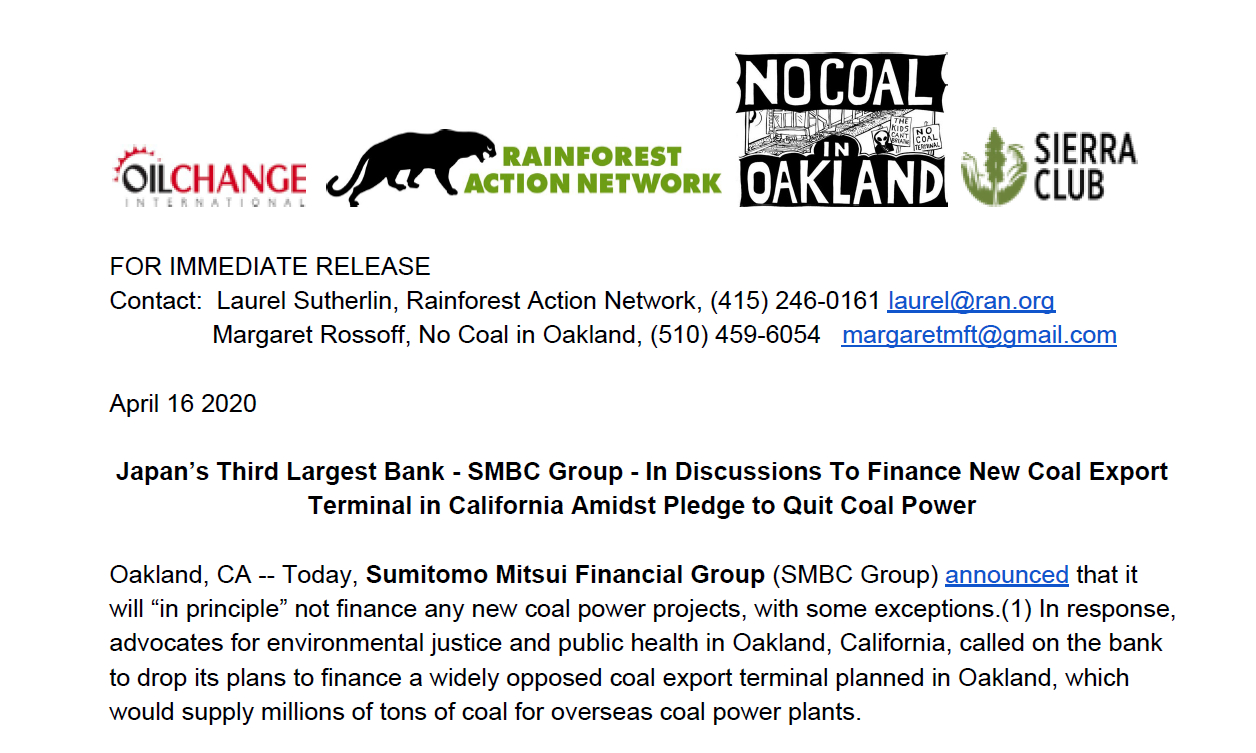NCIO challenges Japanese Bank: don’t fund Oakland coal terminal
In the last couple of days, two major Japanese banks have announced that they are limiting their investment in coal. This is of particular significance for No Coal in Oakland, as one of these banks, Sumitomo Mitsui Banking Corporation (SMBC), has been in discussion about providing financing for the construction of the Oakland Bulk and Oversized Terminal (OBOT) as a coal terminal to ship four million tons of Utah coal to the Japanese energy company JERA. Japan has been increasing its consumption of coal as it has retired nuclear power plants after the Fukushima disaster.
SMBC is the third largest bank in Japan. Its new policy calls for the “consideration of risks” that could mean limiting investment in coal-fired power plants and coal mining, as well as other fossil fuels. No Coal in Oakland, along with other environmental organizations, notes that investing in OBOT as a coal terminal contradicts the direction of this policy: the four million metric tons of coal shipped to Japan would be used in the power plants from which SMBC should be withdrawing. Staff at SMBC has been contacted directly regarding reasons an Oakland coal terminal would be a bad investment for the bank due to both reputational and financial risks.
A press release highlighting this contradiction was sent out by NCIO on April 16, 2020 in collaboration with Rainforest Action Network, Oil Change International, and the Sierra Club. NCIO learned that SMBC is considering supporting OBOT through a sworn declaration filed in a Kentucky bankruptcy court by John J. Siegel, Jr., the CEO of Insight Terminal Solutions, the company that aims to build and operate OBOT. Siegel stated that, in discussions held last summer, JERA considered purchasing the coal; and SMBC, the banker for JERA, “discussed providing the full construction financing of approximately $240 million USD to build the Terminal.” (See Would-be Oakland Coal Baron’s Bankruptcy Exposes Filthy Scheming) We do not know the current status of these discussions. We see the announcement of SMBC’s new policy, however limited, as an opportunity to put pressure on the bank not to finance OBOT.
In another development, Mizuho, the fourth largest bank in Japan, has announced that it will stop funding new coal power projects and end all loans for coal. (See Mizuho to stop lending to new coal power projects, Reuters, April 14, 2020).
Although inadequate–with a ludicrous deadline of 2050–this policy is a first step. Significantly, it responds to activist pressure. The bank was facing a shareholder resolution at its June meeting calling for disclosure of a plan outlining a business strategy to align its investments with the goals of the Paris Agreement. Rainforest Action Network has been working with the bank on their fossil fuel and deforestation policies for years, starting with a major action at Mizuho’s shareholder meeting in 2017.
The pending shareholder resolution, building on that activism, was initiated by Kiko Network, whose goals are “the practical implementation of the Kyoto Protocol and the prevention of dangerous climate change.” This is the first time a Japanese publicly traded corporation has faced a shareholder resolution related to climate change. It was supported by investment funds that hold shares in the bank and have assets of $200 billion.
In a similar move, on March 31, a shareholder resolution was also introduced at the meeting of the Bank of Montreal (BMO) to re-evaluate its financing of fossil fuels (See Shareholder resolution calls for Bank of Montreal to stop financing fossil fuels). BMO had been involved in securing funding for OBOT, but there are no indications it is currently working on this. No Coal in Oakland will continue to pursue any and all potential funders of the terminal, to make sure that it is never used for coal.
